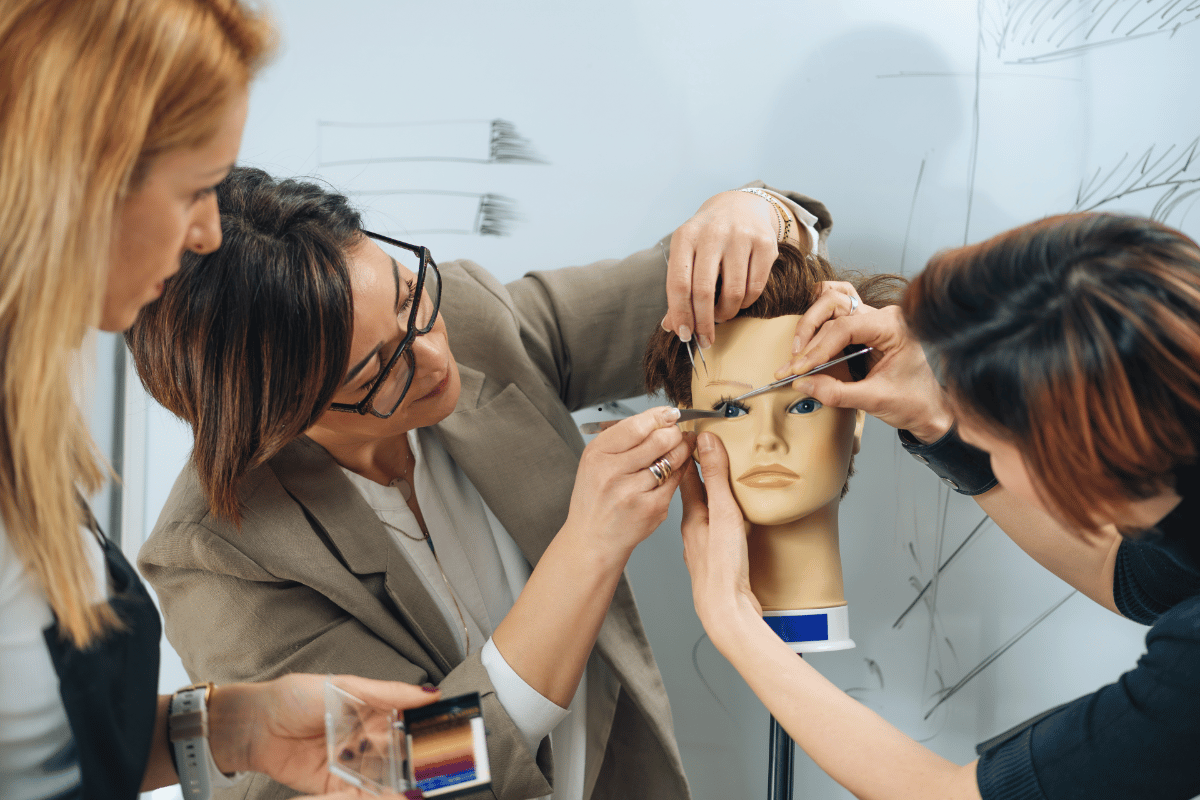Getting the Lowdown on Cosmetology Programs
Cosmetology programs are your ticket to mastering the beauty biz. We’re talking hair styling, skincare, nail care, salon management, makeup magic, and even customer schmoozing. Graduates can snag jobs as hairstylists, estheticians, or nail techs in salons, spas, or wellness centers. And hey, the median salary for cosmetologists in 2023 is a cool $35,080 (College Essay Guy).
What You’ll Learn in Cosmetology Training
Cosmetology training is a mix of book smarts and hands-on hustle. You’ll pick up essential skills and let your creativity fly while practicing on mannequins and real folks. Expect to dive into haircutting, hair coloring, chemical treatments, skincare, nail services, makeup, cleanliness, and running a salon.
Programs vary in length. Some, like the Aveda Institute, can get you certified in just 13 months (Aveda Institute). Others, especially those aiming for an associate degree, might take up to two years.
Career Paths in Cosmetology
Once you finish a cosmetology program, the job market is your oyster. Here are some gigs you might land:
- Hair Stylist: Snip, style, and color hair. You’ll chat with clients to nail down their dream look and make it happen.
- Nail Technician: Manicures, pedicures, and nail art are your jam. You might also do nail extensions or gel polish.
- Esthetician: Skincare is your game. Facials, body treatments, hair removal, and makeup are all in your wheelhouse. You’ll assess skin conditions and suggest treatments.
- Barber: Focus on men’s haircuts, beard grooming, and shaving. You might also offer scalp treatments.
The beauty industry is a playground for creativity and growth. With new tech and trends popping up all the time, you’ll always have fresh skills to learn and keep your services in demand.
Ready to jump into cosmetology? Check out the vocational training programs at beauty schools across the U.S. and beyond. These programs give you the foundation to shine in your chosen career.
How Long and How Much for Cosmetology Training?
Thinking about diving into the world of cosmetology? Let’s break down the time and money you’ll need to get started. These are big factors in planning your future career, so let’s get into it.
How Long Does Cosmetology School Take?
The time you’ll spend in cosmetology school can vary. It depends on where you live and whether you’re going full-time or part-time. Generally, it can take anywhere from 8 months to 2 years. Some schools even offer fast-track programs. For instance, the Aveda Institute has a program that wraps up in just 13 months (Aveda Institute).
While you’re in school, you’ll learn all sorts of skills—haircare, skincare, nail care, and more. You’ll also get hands-on practice in student salons and clinics, which is super important for building your confidence and skills.
How Much Does Cosmetology Training Cost?
The cost of cosmetology school can be all over the map. If you’re just looking for a certificate, you could be done in as little as nine months, and it might only set you back around $1,000 (Colleges and Degrees).
If you’re aiming for an associate degree, you’re looking at about two years of school. The price tag for that can range from $6,000 to $30,000, depending on where you go (Colleges and Degrees).
You’ll want to do some homework on different programs. Look at tuition fees, but don’t forget about textbooks, supplies, and other extras. Some schools offer financial aid, scholarships, or payment plans to help you out.
Before you sign up, make sure you know what you’re getting into financially. Create a budget to see if the costs fit with your financial situation and goals.
Making the Decision
By thinking about how much time and money you’ll need, you can make a smart choice about your cosmetology training. Whether you go for a quick certificate or a longer associate degree, investing in your education can lead to a fun and creative career in the beauty industry.
Getting Licensed and Accredited in Cosmetology
Want to dive into the world of beauty and style? Before you start snipping and styling, you need to get licensed and complete an accredited cosmetology program. Let’s break down what you need to know about getting your cosmetology license and why accreditation matters.
How to Get Your Cosmetology License
Every state has its own rules for licensing cosmetologists, but they all want to make sure you know your stuff. Here’s the lowdown on what you generally need:
- Education and Training: First off, you gotta finish a state-approved cosmetology program. This could be at a vocational school or a vocational training program. The number of hours you need to complete varies depending on where you live.
- Age Requirements: Most states require you to be at least 16 or 18 years old to get your license. Check your state’s specific age requirement.
- Examination: After your training, you’ll need to pass a national licensing exam. This test covers everything from hairstyling to skincare, makeup, and nail care.
Remember, the exact requirements can differ from state to state. Some states might have additional rules about classwork hours or educational background. To make sure you’re on the right track, check with your state’s licensing board. For more details, you can also read our article on vocational training for cosmetology.
Why Accreditation Matters in Cosmetology Programs
Accreditation is like a stamp of approval for cosmetology programs. The National Accrediting Commission of Career Arts & Sciences (NACCAS) is the big name in the game. If a program is accredited by NACCAS, you know it’s legit (Colleges and Degrees).
Accredited programs go through a tough review process to make sure they meet high standards. This includes looking at the curriculum, teacher qualifications, facilities, student support, and how well students do after they graduate. When you pick an accredited program, you can be sure you’re getting a solid education that will prep you for the real world.
Plus, if you need financial aid or scholarships, you usually have to be in an accredited program to qualify. So, accreditation not only means a quality education but also opens doors to financial help.
When you’re shopping around for cosmetology programs, make sure they’re accredited by bodies like NACCAS. This way, you know the program meets industry standards and will give you the skills you need.
By understanding the licensing requirements and the importance of accreditation, you can make smart choices as you start your cosmetology career. Licensing and accreditation ensure you get the education and training you need to succeed and offer top-notch services to your clients.
Specializations and Training Options
Thinking about a career in cosmetology? There’s a bunch of specializations and training routes you can take. These options let you zero in on what you love and get really good at it. Let’s check out some career paths and the training programs that can get you there.
Career Paths in Cosmetology
The beauty biz is packed with different specialties. Here are some popular ones:
- Hair Stylist: These folks cut, style, and color hair. They work with clients to create unique looks and give hair care tips.
- Nail Technician: Nail techs handle manicures, pedicures, and nail enhancements. They make sure clients’ nails are healthy and look great.
- Esthetician: Estheticians focus on skin treatments like facials and waxing. They help clients keep their skin in top shape.
- Barber: Barbers cut and groom men’s hair. They’re pros at different cutting techniques and often offer shaving and beard grooming services.
Picking a career path helps you focus your training and build the skills you need to shine in your chosen field.
Training Programs in Cosmetology
To kickstart your cosmetology career, you can join vocational training programs at beauty or vocational schools (Colleges and Degrees). These programs teach you the ins and outs of various cosmetology skills. Here are some popular ones:
- Cosmetology Program: This all-in-one program covers hair styling, cutting, coloring, nail care, skincare, and more. You get hands-on experience and learn the latest industry trends.
- Barbering Program: If you want to be a barber, these programs focus on men’s grooming techniques like hair cutting, shaving, and beard styling.
- Esthetics Program: These programs specialize in skincare treatments. You learn about different skin types, facial treatments, and hair removal methods.
- Nail Technology Program: Nail tech programs focus on nail care and beautification. You learn about manicures, pedicures, nail art, and using various nail products and tools.
Choosing a reputable training program is key. Look for schools that meet industry standards and offer solid practical experience. For example, the Paul Mitchell School is well-known for its personalized teaching, hands-on client experience, and quality resources (Quora). But there are plenty of other beauty and vocational schools across the U.S. and worldwide.
When picking a program, think about the curriculum, hands-on experience, faculty expertise, post-graduation support, and cost. Some programs also prep you for state board exams and offer job placement help after graduation (Quora).
By choosing a specialized training program in cosmetology, you can gain the skills and knowledge needed to start a successful career in your chosen area.


